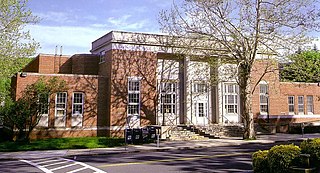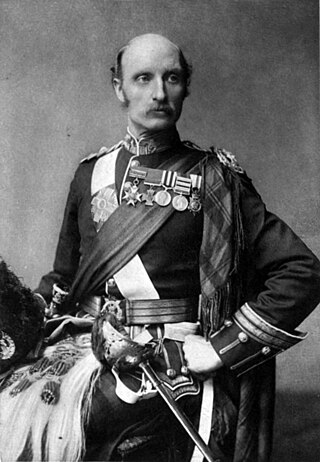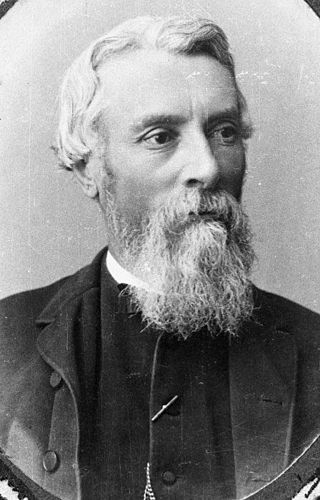Related Research Articles

Scarsdale is a town in Westchester County, New York, United States. The Town of Scarsdale is coextensive with the Village of Scarsdale, but the community has opted to operate solely with a village government, one of several villages in the state that have a similar governmental situation. As of the 2020 census, Scarsdale's population was 18,253.

Field Marshal Sir George Stuart White, was an officer of the British Army. He was stationed at Peshawar during the Indian Mutiny and then fought at the Battle of Charasiab in October 1879 and at the Battle of Kandahar in September 1880 during the Second Anglo-Afghan War. For his bravery during these two battles, he was awarded the Victoria Cross. He went on to command a brigade during the Third Anglo-Burmese War in 1886 and became commander of Quetta District in 1889 in which role he led operations in the Zhob Valley and in Balochistan. He was commander of the forces in Natal at the opening of the Second Boer War and fought at the Battle of Elandslaagte in October 1899. He commanded the garrison at the siege of Ladysmith: although instructed by General Sir Redvers Buller to surrender the garrison he responded "I hold Ladysmith for the Queen" and held out for another 75 days before being relieved in February 1900. He finished his career as Governor of Gibraltar and then as Governor of the Royal Hospital Chelsea.

Admiral of the Fleet Sir Arthur Knyvet Wilson, 3rd Baronet, was a Royal Navy officer. He served in the Anglo-Egyptian War and then the Mahdist War being awarded the Victoria Cross during the Battle of El Teb in February 1884. He went on to command a battleship, the torpedo school HMS Vernon and then another battleship before taking charge of the Experimental Torpedo Squadron. He later commanded the Channel Fleet. He briefly served as First Sea Lord but in that role he "was abrasive, inarticulate, and autocratic" and was really only selected as Admiral Fisher's successor because he was a supporter of Fisher's reforms. Wilson survived for even less time than was intended by the stop-gap nature of his appointment because of his opposition to the establishment of a Naval Staff. Appointed an advisor at the start of World War I, he advocated offensive schemes in the North Sea including the capture of Heligoland and was an early proponent of the development and use of submarines in the Royal Navy.

Admiral of the Fleet Sir George Cockburn, 10th Baronet, was a Royal Navy officer and politician. As a captain he was present at the Battle of Cape St Vincent in February 1797 during the French Revolutionary Wars and commanded the naval support at the invasion of Martinique in February 1809 during the Napoleonic Wars.

Sir John Hall was a New Zealand politician who served as the 12th premier of New Zealand from 1879 to 1882. He was born in Kingston upon Hull, England, the third son of George Hall, a captain in the navy. At the age of ten he was sent to school in Switzerland and his education continued in Paris and Hamburg. After returning to England and being employed by the Post Office, at the age of 27 he decided to emigrate. He was also Mayor of Christchurch.

Sir Gilbert Heathcote, 1st Baronet was an English merchant and Whig politician who sat in the English and British House of Commons between 1701 and 1733. He also served as the governor of the Bank of England and was Lord Mayor of London in 1711.

William John Alexander Montgomery was a New Zealand politician and merchant from Little River on Banks Peninsula. Born in London, he lived in a number of places and pursued a number of occupations before settling in Christchurch, New Zealand.

William Rolleston was a New Zealand politician, public administrator, educationalist and Canterbury provincial superintendent.

Admiral of the Fleet Rosslyn Erskine Wemyss, 1st Baron Wester Wemyss,, known as Sir Rosslyn Wemyss between 1916 and 1919, was a Royal Navy officer. During the First World War he served as commander of the 12th Cruiser Squadron and then as Governor of Moudros before leading the British landings at Cape Helles and at Suvla Bay during the Gallipoli campaign. He went on to be Commander of the East Indies & Egyptian Squadron in January 1916 and then First Sea Lord in December 1917, in which role he encouraged Admiral Roger Keyes, Commander of the Dover Patrol, to undertake more vigorous operations in the Channel, ultimately leading to the launch of the Zeebrugge Raid in April 1918.

Admiral of the Fleet Lord John Hay, was a Royal Navy officer and politician. After seeing action in 1842 during the First Opium War, he went ashore with the Naval Brigade and took part in the defence of Eupatoria in November 1854 and the Siege of Sevastopol in spring 1855 during the Crimean War. He also took part in the Battle of Taku Forts in August 1860 during the Second Opium War. As a politician, he became Member of Parliament for Wick and later for Ripon. He was sent to the Mediterranean in July 1878 to take control of Cyprus and to occupy it in accordance with decisions reached at the Congress of Berlin. In a highly political appointment, he was made First Naval Lord in March 1886 when the Marquis of Ripon became First Lord of the Admiralty but had to stand down just five months later when William Gladstone's Liberal government fell from power in August 1886.
The Rushworth Football Club is an Australian rules football club based in the town of Rushworth, Victoria, Australia. The club is one of 12 member clubs in the Kyabram & District Football League and are known as the 'Tigers'. They wear a black jumper with horizontal gold stripe.

Frederic Jones was a New Zealand politician. Originally from England, he settled in the colony in 1863 for health reasons.
Avon is a former New Zealand parliamentary electorate. It was created for the 1861 general election and existed until 1996. It was represented by 13 Members of Parliament and was held by Independents, Liberal Party or Labour Party representatives.
Heathcote was a 19th-century parliamentary electorate in Christchurch, New Zealand.

Aaron Ayers arrived in Christchurch, New Zealand, from England as a newly married man in his mid 20s. He was a hairdresser and tobacconist for two decades before entering the auctioneering business. He was elected Mayor of Christchurch in 1885 unopposed, and was re-elected a year later in the most keenly contested mayoral election thus far, narrowly beating Charles Louisson. He retired after his second term as mayor. In 1887 he contested a 1887 by-election for Heathcote and the 1887 election for Christchurch South, but came second on both occasions. After his mayoralty, he lived mostly a private life and was known as an avid gardener.
Lee Justin Evans, an Australian politician. He was a member of the New South Wales Legislative Assembly representing Heathcote for the Liberal Party from 2011 until 2023.
Heathcote, an electoral district of the Legislative Assembly in the Australian state of New South Wales, has had two incarnations, the first from 1971 to 1991, the second from 1999 to the present.
The 1911 Horncastle by-election was a UK parliamentary by-election held on 16 February 1911 in the constituency of Horncastle in Lincolnshire. It was triggered upon the succession to the peerage of the sitting Member of Parliament, Gilbert Heathcote-Drummond-Willoughby, and was won by Archibald Weigall of the Conservative Party.
The 1862 Heathcote by-election was a by-election held on 12 June 1862 during the 3rd New Zealand Parliament in the Christchurch electorate of Heathcote.
The 1863 Heathcote by-election was a by-election held on 28 October in the Heathcote electorate during the 3rd New Zealand Parliament.
References
- ↑ "Election". The Star. 8 February 1887.
- ↑ "Election". South Canterbury Times. 9 February 1887.
- ↑ "Meetings, Amusements". Lyttelton Times. 8 February 1887.